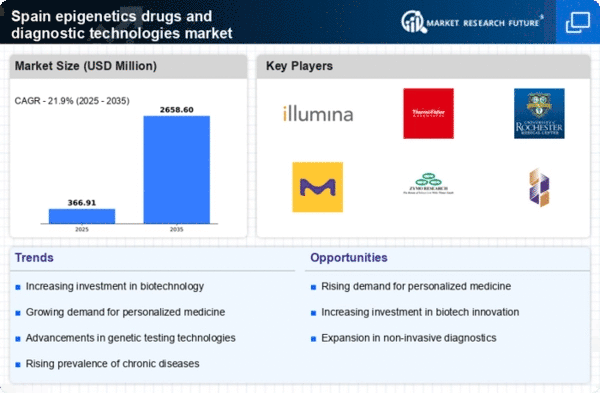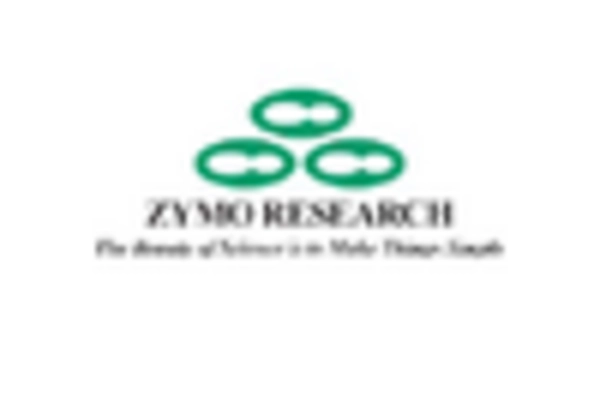Supportive Regulatory Environment
A supportive regulatory environment in Spain is fostering the growth of the epigenetics drugs-diagnostic-technologies market. Regulatory agencies are increasingly recognizing the importance of epigenetic research and are streamlining approval processes for new therapies and diagnostics. This proactive approach is encouraging companies to invest in the development of epigenetic products, as they can navigate the regulatory landscape more efficiently. Additionally, the European Medicines Agency (EMA) has established guidelines that facilitate the evaluation of epigenetic therapies, further enhancing market confidence. As regulations become more favorable, the epigenetics drugs-diagnostic-technologies market is likely to experience accelerated growth, attracting more players and innovations.
Rising Prevalence of Chronic Diseases
The increasing incidence of chronic diseases in Spain is a pivotal driver for the epigenetics drugs-diagnostic-technologies market. Conditions such as cancer, diabetes, and cardiovascular diseases are becoming more prevalent, necessitating advanced diagnostic and therapeutic solutions. According to recent health statistics, chronic diseases account for approximately 70% of all deaths in Spain, highlighting the urgent need for innovative treatments. The epigenetics drugs-diagnostic-technologies market is poised to address these challenges by offering targeted therapies that can modify gene expression and improve patient outcomes. As healthcare providers seek more effective ways to manage these diseases, the demand for epigenetic solutions is likely to grow, fostering market expansion and innovation.
Investment in Research and Development
Investment in research and development (R&D) within Spain is significantly influencing the epigenetics drugs-diagnostic-technologies market. The Spanish government and private sector are increasingly allocating funds to support innovative research in epigenetics, with R&D expenditure reaching approximately €15 billion in recent years. This financial commitment is fostering advancements in epigenetic therapies and diagnostics, enabling the development of novel products that can transform patient care. Furthermore, collaborations between academic institutions and biotech companies are enhancing the research landscape, leading to breakthroughs in understanding the epigenetic mechanisms underlying various diseases. As R&D continues to thrive, the epigenetics drugs-diagnostic-technologies market is expected to benefit from a steady pipeline of innovative solutions.
Growing Awareness of Epigenetic Therapies
The growing awareness of epigenetic therapies among healthcare professionals and patients is driving the epigenetics drugs-diagnostic-technologies market in Spain. Educational initiatives and conferences are increasingly highlighting the potential of epigenetics in personalized medicine, leading to a greater understanding of how these therapies can be utilized in clinical practice. As awareness increases, healthcare providers are more likely to adopt epigenetic diagnostics and treatments, which could lead to a market growth rate of around 10% annually. This trend suggests that as more practitioners recognize the benefits of epigenetic approaches, the demand for related technologies and drugs will likely rise, further propelling the market forward.
Technological Advancements in Genomic Research
Technological advancements in genomic research are significantly impacting the epigenetics drugs-diagnostic-technologies market. Innovations such as next-generation sequencing (NGS) and CRISPR gene editing are enhancing the ability to study epigenetic modifications and their implications in health and disease. In Spain, the adoption of these technologies is accelerating, with several research institutions investing in state-of-the-art equipment. This progress not only facilitates a deeper understanding of epigenetic mechanisms but also enables the development of more precise diagnostic tools and therapies. As these technologies continue to evolve, they are likely to create new opportunities within the epigenetics drugs-diagnostic-technologies market, driving growth and innovation.
















